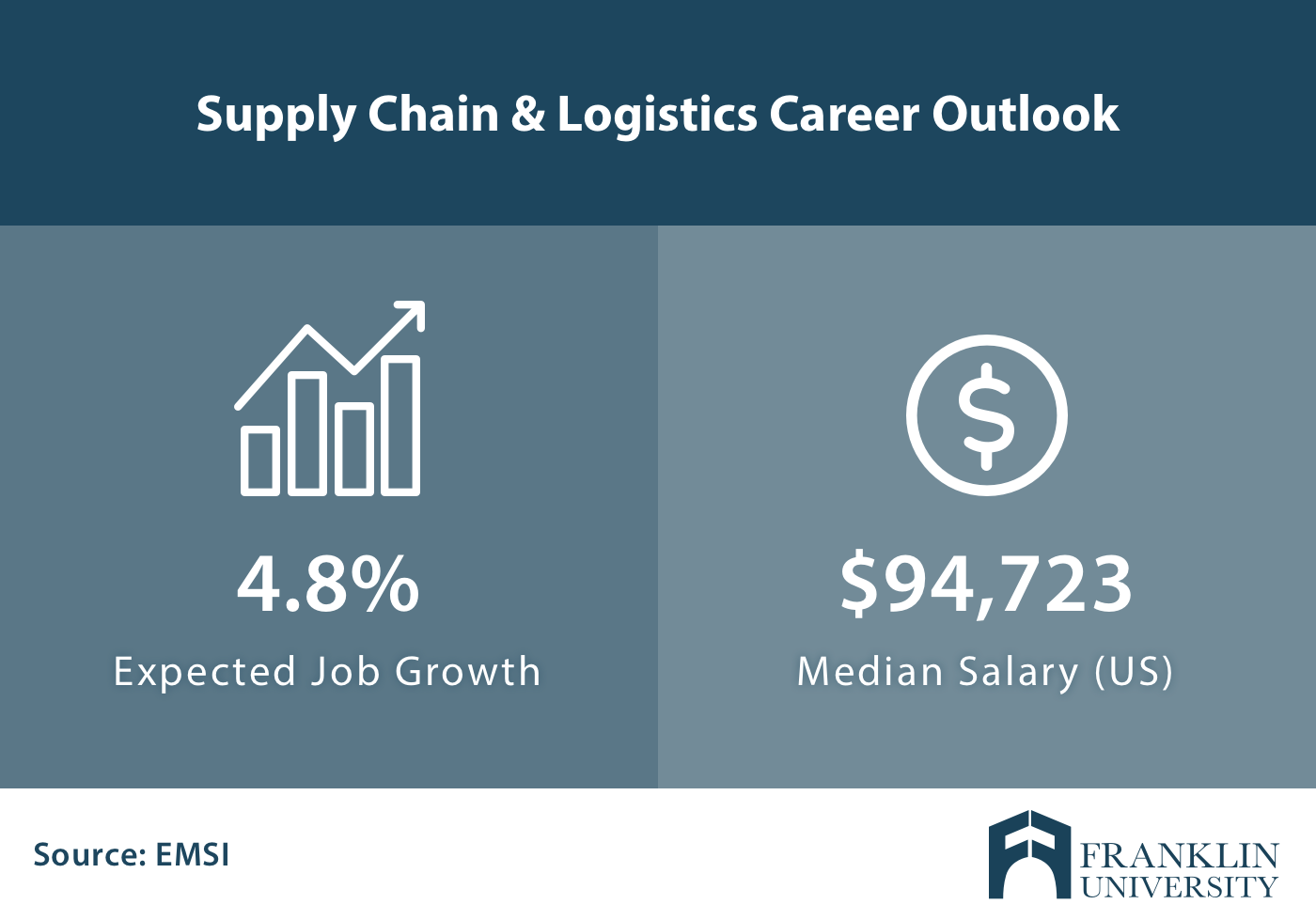Request Information
We're Sorry
There was an unexpected error with the form (your web browser was unable to retrieve some required data from our servers). This kind of error may occur if you have temporarily lost your internet connection. If you're able to verify that your internet connection is stable and the error persists, the Franklin University Help Desk is available to assist you at helpdesk@franklin.edu, 614.947.6682 (local), or 1.866.435.7006 (toll free).
Just a moment while we process your submission.

Is a Supply Chain Management Degree Right for Me?
When you think of supply chain management, you probably envision large manufacturers who produce everything from TVs to phones to cars. You might even imagine logistics and delivery services like FedEx or Amazon. While these industries account for a large percentage of supply chain management and logistics jobs, supply chain and logistics professionals are sought after in nearly every industry.
Any organization looking to streamline processes, increase efficiency and improve productivity needs supply chain and logistics professionals.
What Is Supply Chain Management, Exactly?
Supply chain management revolves around the process of how products and services get from A to Z—from suppliers to consumers. This role is responsible for adhering to strict budgets, timelines, regulations and quality standards.
It’s anything but simple.
But for the right person, it’s also an incredibly rewarding career where you can see the direct and tangible impact of your contributions while working in a stable and well-paying field. So, how do you know if you’re that right person? And, do you need a supply chain management degree to succeed?
Market Demand for Supply Chain and Logistics Professionals

The market for supply chain and logistics professionals is strong.
Over the next five years, job growth for supply chain and logistics professionals is projected to be 4.8%. This high-stakes job also commands high salaries. The median salary for transportation, storage, and distribution managers in the United States is $94,723.
Supply chain management can cover a wide variety of jobs. Depending on your career aspirations, you may choose to oversee the entire supply chain or choose a specialization within this field. Here are five in-demand jobs you can get in supply chain management:
When it comes to paying for school, grants are among your best options. But do you know how to find them? Remove the guesswork by downloading this free guide
Supply Chain Manager ($107,480 median salary)
Supply chain managers are responsible for the entire product lifecycle—from raw materials through final delivery. Their goal is to limit costs, improve accuracy, customer service, and safety. They look for opportunities to streamline processes and improve productivity to meet distribution needs.
This is a fast-paced job with high levels of responsibility. Supply chain managers are needed in a variety of major industries—from manufacturing to healthcare and technology. Successful supply chain managers are avid problem solvers, quick decision-makers and good negotiators.
General and Operations Manager ($100,930 median salary)
It’s the role of the general and operations manager to help companies implement strategies that will enable the company to attain its goals. General and operations managers plan, direct and coordinate a vast range of activities—from overseeing daily operations to big-picture decisions about personnel and policies.
You have to be extremely flexible to succeed as a general and operations manager. You need to have a good grasp on all facets of company operations as job responsibilities can vary widely based on the organization you work for. This career also commonly demands long hours and travel, so you should be prepared for a less predictable work schedule.
Purchasing Manager ($118,934 median salary)
Purchasing managers buy products and services for organizations to use or resell. They focus on the beginning of the supply chain—evaluating suppliers, negotiating contracts and reviewing the quality of raw materials secured to develop their company’s products.
A purchasing manager must inherently be a people person who excels at building strong relationships. These professionals often work with suppliers from across the world, so strong cultural understanding and communication skills are essential.
Industrial Production Manager ($103,376 median salary)
Industrial production managers oversee the daily operations of manufacturing companies. They’re on the floor managing personnel, production lines, and solving challenges as they arise.
Industrial production managers are held to high standards, strict production schedules and tight budgets, so you must excel in working under pressure. As technology advances, these professionals must also be data-driven in their decision-making to increase efficiency and productivity.
Transportation Manager ($94,730 median salary)
Transportation managers oversee the transportation operations of a company, like Amazon, or the activities of organizations that provide transportation services, like FedEx. From air to road to rail, these professionals develop dispatching, routing, and tracking strategies for more efficient, streamlined and cost-effective deliveries.
A transportation manager must excel in both detailed and big-picture thinking. They must be a good multi-tasker, able to simultaneously balance government regulation, union policies and company safety and environmental goals.
Do these careers sound like they’re up your alley, but you’re not convinced a supply chain management degree is necessary? Here’s why you need one.
Is a Degree Really Necessary To Succeed In Supply Chain Management?
In the past, many of these professionals rose through the ranks without formal education. But the increasing demands of these jobs, especially from a technical and analytical standpoint, are causing the bar for education to rise.

“Rapidly advancing technology and globalization continue to change this industry,” says Dr. Brian Gregory, Program Chair, Operations & Supply Chain Management and Logistics Management at Franklin University, “As a supply chain manager in today’s world, you need to understand the global environment and be able to use the latest tools and technologies to be as efficient as possible, because things can change on a dime. A supply chain management degree arms you with these skills.”
When it comes to supply chain management degrees, most degrees are earned at the bachelor’s level, at 67%, while master’s degrees are also increasing in popularity, accounting for 10% of degree completions.
Still not convinced? Here are ten skills you’ll gain by earning a Supply Chain Management Degree:
- Purchasing and Inventory Management: Gain the skills to identify, select and negotiate with suppliers, as well as manage raw materials and product inventory.
- Project and Operations Management: Learn how to develop nimble, streamlined processes to manage people, materials and products at every step in the supply chain.
- Business Modeling and Forecasting: Learn quantitative methods to identify business opportunities and solve common logistics challenges.
- Auditing and Quality Management: Understand cutting-edge methods to impact efficiency while maintaining high quality and safety standards.
- Transportation and Logistics Management: Gain tools and techniques that will help you design and operate global logistics systems and quickly respond to challenges that arise.
- Leadership: Advance your leadership abilities by becoming a humble team player who also knows when to take control and make decisions.
- Communication: Learn how to communicate across roles and in different contexts to help you work effectively with suppliers, employees and company leadership.
- Problem Solving: Practice quick-thinking skills to respond to issues, as well as big-picture problem-solving skills that help you proactively plan for and avoid problems.
- Innovation: Challenge yourself to develop new and innovative policies, processes and operations strategies that can improve things like productivity, profitability and quality.
- Detail Orientation: Learn to understand and scrutinize small details to identify business opportunities and avoid costs.
8 Questions to Ask Yourself Before Deciding if a Supply Chain Management Degree is Right for You
Supply chain and logistics management is a demanding career. But it’s also one of the most exciting areas of growth for hungry, driven professionals who are looking to make a real impact in their jobs.
Before you decide if you want to pursue a supply chain management degree, ask yourself:
- Do I thrive in a dynamic work environment?
- Am I a nimble thinker who is solutions-oriented when faced with a problem?
- Am I a leader who both works well with others and likes to have decision-making power?
- Do I always look for new and innovative ways to solve everyday challenges?
- Can I excel while balancing equally important, and sometimes competing, priorities?
- Am I the type of person who stays calm and collected under pressure?
- Do I enjoy working with people in a wide variety of roles and understand how to communicate with them differently?
- Do I love to travel? Am I ok with working outside of traditional 9–5 hours?
Ready to Take the Next Step?
Supply chain management is a rapidly changing field that requires cutting-edge technical abilities, critical thinking and problem-solving skills. Get ahead in this exciting and fast-paced career by pursuing an Operations and Supply Chain Management Degree at Franklin University—a flexible bachelor's degree program designed to teach you in-demand skills that are immediately applicable to your career.





